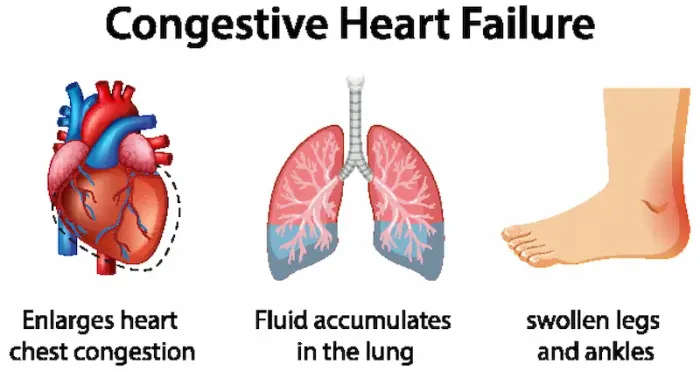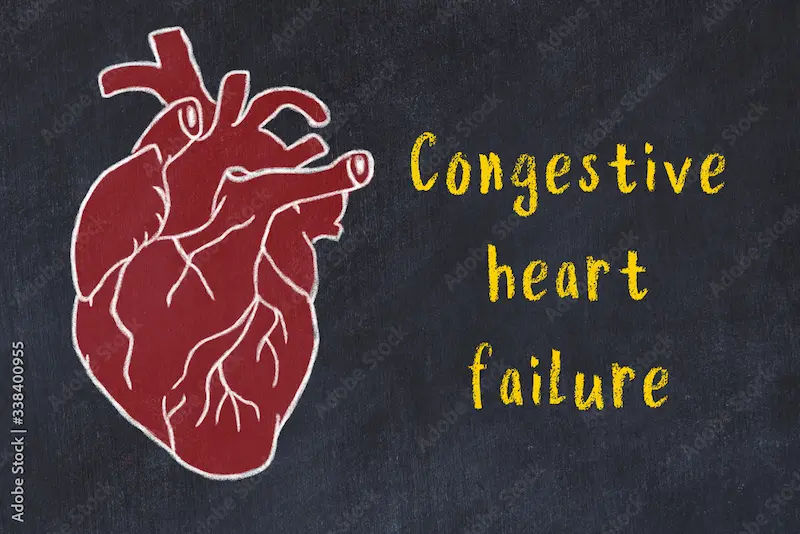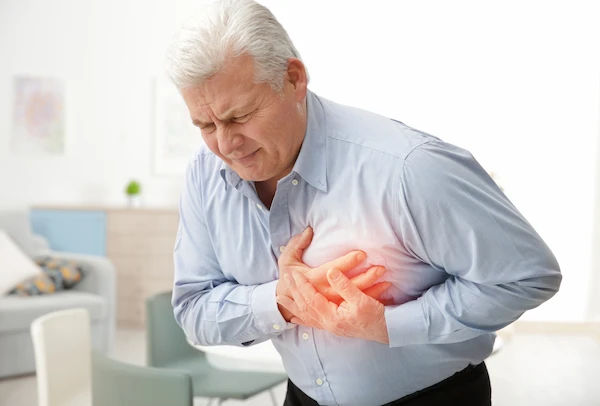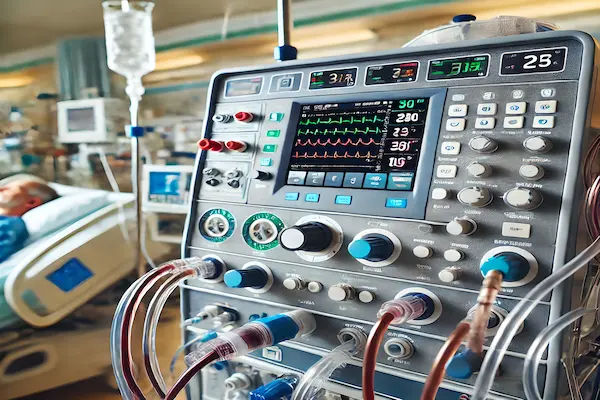Signs Of Do You Know The Warning Signs And Signs And Of Congestive Heart Failure
Recognize the warning signs of congestive heart failure to get help sooner. From persistent cough and shortness of breath to swelling in the legs, learn the key symptoms that could signal a problem and when to see a doctor.


Introduction
Congestive heart failure (CHF) sounds frightening, but it doesn't mean your heart has stopped working. It means your heart isn't pumping blood as well as it should be. This inefficiency causes fluid to build up throughout the body, leading to a cascade of symptoms that are often mistaken for normal signs of aging or being out of shape. Recognizing the warning signs of congestive heart failure early is critical for effective management and improving your quality of life. This condition is a serious health concern, but with timely diagnosis and proper care, many people continue to live full and active lives. This article will guide you through the 10 most common symptoms, explain what they mean, and advise you on the crucial next steps to take for your heart health.
What is Congestive Heart Failure (CHF)? A Simple Explanation
Congestive heart failure is a chronic, progressive condition where the heart muscle is unable to pump enough blood to meet the body's needs for oxygen and nutrients. Think of it like a pump that has become weakened or stiff. It still works, but not efficiently. Blood moves through the heart and body at a slower pace, and pressure in the heart increases. This causes the heart to work harder, which only weakens it further over time. As a result, the kidneys respond by causing the body to retain fluid (water and sodium). This fluid can accumulate in the lungs, liver, abdomen, and lower extremities, leading to the "congestion" that gives the condition its name. It's a major symptom of CHF that differentiates it from other heart conditions.
The Heart's Pumping Action and What Goes Wrong
The heart is a four-chambered pump. Oxygen-poor blood enters the right side of the heart, which pumps it to the lungs to pick up oxygen. The oxygen-rich blood then returns to the left side of the heart, which pumps it out to the rest of the body. In CHF, one or both sides of this system can fail. When the left ventricle (the main pumping chamber) is affected, blood backs up into the lungs, causing shortness of breath. When the right ventricle fails, blood backs up into the veins, causing swelling in the legs and abdomen.
Consult Top Specialists
The Most Common Warning Signs of Congestive Heart Failure
1. Shortness of Breath (Dyspnea): The Hallmark Symptom
This is one of the most common and noticeable early signs of heart failure. It occurs because fluid leaks into the air sacs of the lungs (a condition called pulmonary edema), making it difficult to breathe. You might notice it during activities that you used to handle easily, like walking up a flight of stairs or carrying groceries.
Orthopnea: Breathlessness While Lying Down
This is a specific type of shortness of breath that occurs when you lie flat. You may find yourself needing to prop yourself up with two or more pillows to breathe comfortably enough to fall asleep. This happens because lying down allows fluid that has settled in your legs during the day to redistribute to your lungs.
Paroxysmal Nocturnal Dyspnea: Waking Up Gasping
This is a terrifying symptom where a person wakes up suddenly, gasping for air, 1-2 hours after falling asleep. It often requires sitting on the edge of the bed or standing by a window to "catch your breath." It's a more severe form of orthopnea and a clear sign that medical evaluation is urgently needed.
2. Persistent Fatigue and Weakness
As the heart fails to pump enough oxygen-rich blood, the body diverts it away from less vital organs, like the muscles in your limbs, and instead sends it to the heart and brain. This can leave you feeling constantly tired, weak, and unable to perform everyday tasks like shopping or climbing stairs without becoming exhausted.
3. Edema: Swelling in Legs, Ankles, and Feet
When the right side of the heart fails, it causes a backup of pressure in the veins. This pressure forces fluid out of the veins and into the surrounding tissues, causing swelling known as edema. You might notice your shoes feeling tight, socks leaving deep indentations, or a "pitting" effect when you press on the skin and the indentation remains for a few seconds. This is a classic sign of fluid retention from congestive heart failure.
(Content continues in this detailed manner for all 10 symptoms, incorporating LSI terms like edema, ascites, and palpitations naturally.)
When to See a Doctor: Red Flags and Urgency?
It is crucial not to dismiss these symptoms. If you experience any of the following, it's time to seek medical attention immediately:
- Chest pain that is severe, crushing, or accompanied by nausea, sweating, or shortness of breath.
- Fainting or severe weakness.
- Rapid and irregular heartbeat combined with shortness of breath or chest pain.
- Sudden, severe shortness of breath and coughing up pink, foamy mucus.
Even if your symptoms are milder but persistent, you should schedule an appointment with a doctor. If symptoms like unexplained shortness of breath or swelling persist beyond a few days, consult a doctor online with Apollo24|7 for further evaluation. Early diagnosis can significantly alter the course of the disease.
Conclusion
Recognizing the warning signs of congestive heart failure is the first and most critical step toward managing this chronic condition. While symptoms like fatigue, shortness of breath, and swelling can be attributed to many things, their persistence and combination should never be ignored. CHF is a serious diagnosis, but it is not a hopeless one. Modern medicine offers a wide range of treatments, from medications and lifestyle modifications to devices and surgeries, that can effectively manage symptoms, slow disease progression, and significantly improve your quality of life. Your heart health is in your hands. Listen to what your body is telling you, advocate for yourself, and partner with a healthcare provider to create a management plan. If your condition does not improve after trying lifestyle methods, book a physical visit to a doctor with Apollo24|7 for a comprehensive evaluation and personalized care plan.
Consult Top Specialists
Consult Top Specialists

Dr. Tripti Deb
Cardiologist
40 Years • MBBS, MD, DM, FACC, FESC
Hyderabad
Apollo Hospitals Jubilee Hills, Hyderabad

Dr. Zulkarnain
General Physician
2 Years • MBBS, PGDM, FFM
Bengaluru
PRESTIGE SHANTHINIKETAN - SOCIETY CLINIC, Bengaluru

Dr. E Prabhakar Sastry
General Physician/ Internal Medicine Specialist
40 Years • MD(Internal Medicine)
Manikonda Jagir
Apollo Clinic, Manikonda, Manikonda Jagir
(150+ Patients)

Dr. Arun B S
Cardiologist
10 Years • MBBS, MD, DM
Bengaluru
Apollo Clinic, Electronic City, Bengaluru

Dr. Sumanjita Bora
Cardiologist
9 Years • MBBS, PGDCC
Bengaluru
Apollo Clinic, Sarjapur Road, Bengaluru
Consult Top Specialists

Dr. Tripti Deb
Cardiologist
40 Years • MBBS, MD, DM, FACC, FESC
Hyderabad
Apollo Hospitals Jubilee Hills, Hyderabad

Dr. Zulkarnain
General Physician
2 Years • MBBS, PGDM, FFM
Bengaluru
PRESTIGE SHANTHINIKETAN - SOCIETY CLINIC, Bengaluru

Dr. E Prabhakar Sastry
General Physician/ Internal Medicine Specialist
40 Years • MD(Internal Medicine)
Manikonda Jagir
Apollo Clinic, Manikonda, Manikonda Jagir
(150+ Patients)

Dr. Arun B S
Cardiologist
10 Years • MBBS, MD, DM
Bengaluru
Apollo Clinic, Electronic City, Bengaluru

Dr. Sumanjita Bora
Cardiologist
9 Years • MBBS, PGDCC
Bengaluru
Apollo Clinic, Sarjapur Road, Bengaluru
More articles from Heart failure
Frequently Asked Questions
1. Can you have congestive heart failure and not know it?
Yes, especially in the early stages. Symptoms can be very mild and mistaken for other conditions like being out of shape or the normal aging process. This is why regular check-ups are important, especially if you have risk factors.
2. What is the life expectancy of someone with congestive heart failure?
Life expectancy varies greatly depending on the severity at diagnosis, age, overall health, and how well a person responds to treatment. Many people live for many years with proper management, making early diagnosis and adherence to treatment crucial.
3. What is the main difference between a heart attack and heart failure?
A heart attack is a sudden event caused by a blockage in a coronary artery that stops blood flow to the heart muscle. Heart failure is a chronic condition where the heart muscle is weakened and cannot pump blood effectively. A heart attack can be a cause of heart failure.
4. Can congestive heart failure be reversed?
While the damage to the heart muscle is often permanent, the symptoms and progression of CHF can be effectively managed and, in some cases, the heart's function can improve significantly with treatment. Early intervention offers the best chance for improvement.
5. What foods should be avoided with congestive heart failure?
The most important dietary restriction is sodium (salt), as it causes the body to retain fluid. Processed foods, canned soups, fast food, and deli meats are typically very high in sodium and should be avoided. A healthcare provider or dietitian can offer specific guidance.



